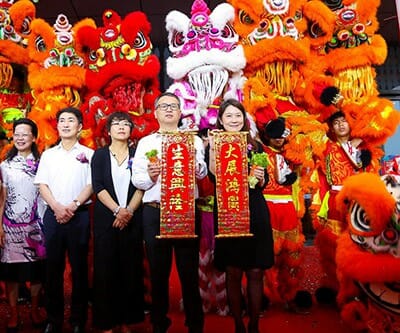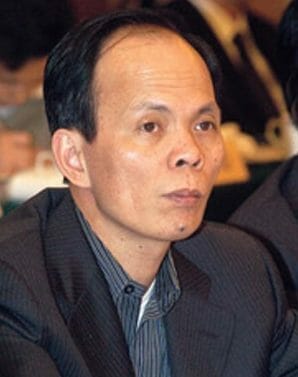
Officials presided over the opening of Nanchang Wanda Plaza West Lake in June of this year
During the last few weeks Dalian Wanda Group has announced the sale of more than $9.3 billion of its domestic hotel and tourism projects as the property developer controlled by billionaire Wang Jianlin struggles with a mountain of debt and close scrutiny by mainland market regulators.
However, in addition to these publicly announced asset sales, the developer also last month sold a newly completed, 147,800 square metre mall in the capital of China’s Jiangxi province, through its privately held Dalian Wanda Commercial Properties.
Wanda contends that the sale of the Nanchang Wanda Plaza West Lake, in the southern China city of Nanchang is part of a strategic shift towards operating as a service provider, rather than an asset owner. However, the unannounced asset sale, along with Wanda’s recent sale of another property in the southern China city of Guilin, has triggered questions regarding the health of the company’s domestic operation, following a string of bad news concerning its overseas projects.
Hopson Relatives Buy Nanchang Mall

The buyers of the Nanchang mall are said to be related to Hopson chairman Zhu Mengyi
The July transaction involved Wanda Commercial Properties sale of Nanchang West Lake Wanda Plaza, which opened on June 23rd of this year. By July 5th, the title to the shopping mall in the Chaoyang Xincheng area of the city’s Xihu district had been transferred to Pearl River Life Insurance Company Limited, according to a report on mainland news site Sina, citing local government records.
“Media reports today regarding the sale of Nanchang Wanda Plaza West Lake are purely a misunderstanding,” Wanda said in response to the asset sale controversy. “It is a part of the Wanda Plaza asset light strategy, and Nanchang Wanda Plaza West Lake is part of the first batch of asset light projects.”
Pearl River Life Insurance, the Guangzhou-based buyer of Wanda’s Nanchang project, is invested by Pearl River Investment Holdings, Guangzhou Finance Holdings, Guangdong New South Group and other companies. The legal representatives of Pearl River Investment and Guangdong New South Group are said to be relatives of Zhu Mengyi, chairman of Hong Kong-listed, Guangzhou-based developer Hopson Development Holdings.
Wanda Asset Sale Continues
Wanda’s July sale of the Nanchang mall is only the latest in a series of asset disposals as the company ramps up its pursuit of Wang Jianlin’s “asset-light” business model.
On June 8th, Dalian Wanda Commercial Properties is said to have transferred control of Jiujiang Wanda Properties Co., Ltd, which holds the Jiujiang Wanda Plaza to Beijing-based investment firm China Minsheng Trust. The same trust on May 27th took control of Fuzhou Wanda Plaza Investment Co., Ltd, which controls the Fuzhou Wanda Plaza in Jiangxi Province, according to the Sina account.
In April Wanda Commercial sold 100 percent of its interest in the holding company controlling Yancheng Wanda Plaza in northern Jiangsu province to CITIC Trust. With Wanda Commercial having been privatized at a price of $4.4 billion in 2016, the financial details of this string of transactions were not released.
Wang Jianlin had declared in 2015 that Wanda would pursue an “asset-light” strategy, emphasizing generating income from building and managing malls, rather than from owning properties. The developer has opened more than 200 malls across China, with Wang having declared a goal of building 1,000 of his retail complexes by 2025.
Developer Reduces Capitalisation of 20 Projects

Nanchang Wanda Plaza West Lake attracted a big crowd for its opening day
In addition to it string of asset sales, local government records reveal that Wanda has been busy reducing the registered capital of at least 20 of the companies holding its Wanda Plazas, according to the Sina report.
Earlier this year the holding company for Tangshan Wanda Plaza in Hebei is said to have reduced its capital from RMB 2.4 billion, down to RMB 50 million, as the most extreme example of its serial revaluations. While Wanda made no announcements regarding the restructuring of these project companies, some analysts have speculated that the firm may have been required to reduce the capitalization of its projects by authorities following audits of company assets.
In the restructuring process the registered capitalisation of nine Wanda Plazas was reduced by 90 percent or more, and all 20 project companies set their new capitalization at RMB 50 million.
Domestic Restructuring Coincides with Cross Border Challenges
Wanda’s domestic asset sales and capital restructuring maneuvers are happening at the same time that the company may be preparing to sell off more than $4.5 billion in offshore real estate holdings.
Late last week the group revealed that it is selling stakes in nearly $4.5 billion in real estate projects across the UK, US, China and Australia to a privately held company controlled by its chairman Wang Jianlin, according to an announcement to the Hong Kong stock exchange on Thursday.
Wanda, China’s largest commercial property developer, has come under regulatory fire over a debt-fueled buying binge that transformed the company into a leading overseas investor, picking up trophy real estate, film studios and sports firms around the world.
In June, Chinese regulators reportedly banned Wanda from receiving new bank loans for six overseas entertainment projects.
Leave a Reply